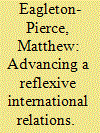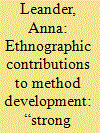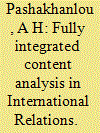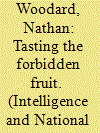|
|
|
Sort Order |
|
|
|
Items / Page
|
|
|
|
|
|
|
| Srl | Item |
| 1 |
ID:
105935


|
|
|
|
|
| Publication |
2011.
|
| Summary/Abstract |
This article advances a call for greater reflexivity in International Relations (IR) to uncover various intellectual and political biases that may obscure the research process. Inspired by existing reflexive practices in IR and, in particular, Pierre Bourdieu's use of such a method, it argues that reflexivity matters for enhancing ethically grounded research, in terms of not only the choice of subjects to study, but also how specific problems are treated, and hence what kind of results can be expected. However, the argument also goes beyond the appeal to autobiographical reflexivity to embrace other dimensions. This includes attention to institutional forces that shape the agency of the scholar and, in turn, the complex relationship between the academy and the wider political world. In the most ambitious sense, the potential for reflexivity can also be conceived collectively in terms of activist intellectuals who seek to reward reflexive practices through dialogue and political intervention. The social space of international trade politics is taken as an empirical example.
|
|
|
|
|
|
|
|
|
|
|
|
|
|
|
|
| 2 |
ID:
149112


|
|
|
|
|
| Summary/Abstract |
Contrary to common assumptions, there is much to be learned about methods from constructivist/post-structuralist approaches to International Relations (IR) broadly speaking. This article develops this point by unpacking the contributions of one specific method—ethnography—as used in one subfield of IR—Critical Security Studies. Ethnographic research works with what has been termed a “strong” understanding of objectivity. When this understanding is taken seriously, it must lead to a refashioning of the processes of gathering, analyzing, and presenting data in ways that reverse many standard assumptions and instructions pertaining to “sound methods.” Both in the context of observation and in that of justification, working with “strong objectivity” requires a flexibility and willingness to shift research strategies that is at odds with the usual emphasis on stringency, consistency, and carefully planned research. It also requires accepting that the engagement of the researcher with the researched is no regrettable inevitability but a potential to be used and mobilized. If these arguments were more widely acknowledged, it would be easier to justify/recognize the methodological foundations of research in the ethnographic tradition. However, it would also require rethinking standard methods instructions and the judgments they inform.
|
|
|
|
|
|
|
|
|
|
|
|
|
|
|
|
| 3 |
ID:
157107


|
|
|
|
|
| Summary/Abstract |
Content analysis has once again come to the forefront of discussions regarding methods in International Relations (IR). The first wave of content analysis in IR lasted from the 1940s to the 1960s and was marked by a commitment to quantitative and manual analyses. The second wave of content analysis appeared at the start of the third millennium and continues to pervade the discipline. As with the first wave, it proceeds in a predominantly quantitative manner but emphasizes computer-assisted analysis rather than manual analysis. Critics and advocates of the method alike have, highlighted numerous shortcomings with these approaches. In order to address these limitations, the present investigation argues for a fully integrated content analysis that has the potential to ameliorate the identified weaknesses that have hitherto plagued the method. It accomplishes this task by combining all facets of the method: quantitative, qualitative, manual, and computer-assisted content analyses within a single research project.
|
|
|
|
|
|
|
|
|
|
|
|
|
|
|
|
| 4 |
ID:
118370


|
|
|
|
|
| Publication |
2013.
|
| Summary/Abstract |
Purposeful politicization is generally viewed as a cardinal sin by intelligence analysts because it degrades objectivity and credibility, and inadvertent influence is sometimes tolerated as a necessary evil in order to make intelligence useful. Some forms of politicization are clearly unethical, but politicization is not inherently evil. In fact it is an ethically neutral form of rhetorical discourse which when properly controlled can provide policymakers with additional decision advantage. When viewed through a rhetorical lens, evidence-based purposeful politicization is more objective than inadvertent influence because it does not try to hide where the evidence leads. By decoupling objectivity and neutrality, it becomes clear that taking a stand on the evidence or making a tough recommendation based on professional judgment are not practices that need to be avoided. As intelligence practitioners seek to remain relevant in the 21st century, embracing ethically-controlled, evidence-based, policy prescriptive analysis can give them the tools they need to succeed.
|
|
|
|
|
|
|
|
|
|
|
|
|
|
|
|
|
|
|
|
|